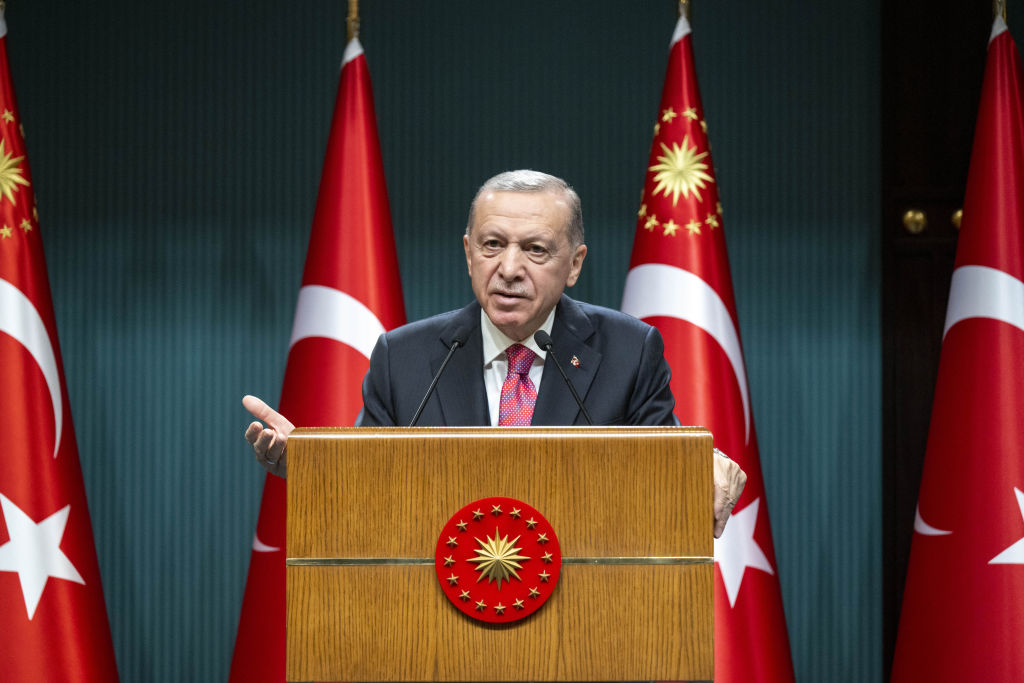
Turkish President Recep Tayyip Erdogan was mayor of Istanbul when a devastating earthquake hit Izmit in 1999, killing more than 17,000 people and devastating the country’s economy. The government’s shambolic response to the natural disaster created an opportunity for Erdogan to burnish his credentials as a capable and compassionate leader, setting the stage for his election as premier in 2003.
Erdogan has maintained an iron rule ever since, outliving economic downturns, refugee crises, corruption scandals, protests movements, and even a coup attempt. But with the May 14 presidential and parliamentary elections just around the corner, seismic shifts both literal and figurative are threatening to upend the president’s grip on power for the first time in two decades.
The most obvious challenge to Erdogan’s reelection is his botched response to the earthquakes that rocked Turkey and Syria in February, which claimed over 45,000 lives and internally displaced some two million people across ten provinces. Accounts from the ground broadcast over social media told a story of overwhelming government incompetence, from delayed rescue efforts and assistance to affected areas to misuse of available resources to an inability to quell unrest and establish public order. Many Turkish citizens also blame Erdogan’s consolidation of power and populist policies for allowing shoddy construction to grow unchecked. While the president may be able to weaponize his control of the media and government spending to contain the immediate political fallout, the damage to his credibility as a steady hand is already done.
Read More: How Erdoğan’s Obsession With Power Got in the Way of Turkey’s Earthquake Response
The second and perhaps more significant challenge to Erdogan’s rule is a main opposition bloc that is for the first time in ages united behind a joint presidential candidate, People’s Republican Party (CHP) leader Kemal Kilicdaroglu. Kilicdaroglu has surprised everyone by managing to consolidate much of Turkey’s notoriously fractious opposition under the umbrella of the Nation Alliance, which comprises social-democrat, center-right, right-wing, and Islamist parties, at the same time as he’s expanded support for the bloc.
To have a shot at beating Erdogan, Kilicdaroglu needs to win over the pro-Kurdish People’s Democratic Party (HDP) and its left-wing Labor and Freedom Alliance—the election’s kingmakers—without alienating his biggest coalition partner, the Turkish nationalist and conservative Good Party (IP). This is a tricky balancing act but one he’s proving capable of pulling off. The CHP leader successfully mended his relationship with the IP after a public row over his engagement with the HDP, and the HDP has already signaled its support for Kilicdaroglu by refraining from fielding a candidate of its own.
Recent polls accordingly show Kilicdaroglu leading the president, although neither candidate likely to attain a first-round win. As things stand, the HDP is also likely to hand the anti-Erdogan Nation Alliance a slim majority in parliament. Critically, an opposition victory in the parliamentary elections would boost Kilicdaroglu’s chances in the second round of the presidential contest.
Of course, it’s too early to say whether Kilicdaroglu will be able to hold the coalition together and sustain his momentum. For example, the HDP could make demands that are non-starters for IP such as cabinet posts or regional autonomy, which would undermine opposition unity.
Erdogan is also a skilled politician with ample experience leveraging his bully pulpit. Having already dismantled or hollowed out most independent checks on his power, including the military, the judiciary, and the media, the president will use any means at his disposal—however heavy-handed or anti-democratic—to tilt the scales in his favor. At a minimum, he will ramp up state-financed handouts to buy votes and try to link the HDP with the outlawed Kurdistan Workers’ Party (PKK) to paint his chief rival as a terrorist sympathizer. Should he feel cornered enough, he could jail opposition leaders under false pretenses and criminalize dissent. Yet nothing he does at this point is likely to earn the president much genuine support outside of his core voter base—even if fear tactics and repression help him secure another term.
One thing is clear: In the 20 years he’s been in power, Erdogan’s political fortunes have never been on shakier footing.
More Must-Reads from TIME
- Donald Trump Is TIME's 2024 Person of the Year
- Why We Chose Trump as Person of the Year
- Is Intermittent Fasting Good or Bad for You?
- The 100 Must-Read Books of 2024
- The 20 Best Christmas TV Episodes
- Column: If Optimism Feels Ridiculous Now, Try Hope
- The Future of Climate Action Is Trade Policy
- Merle Bombardieri Is Helping People Make the Baby Decision
Contact us at letters@time.com